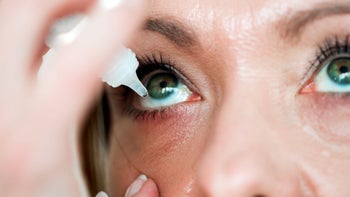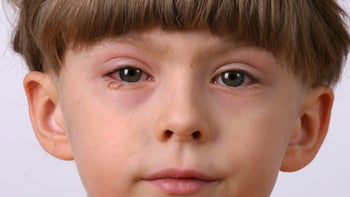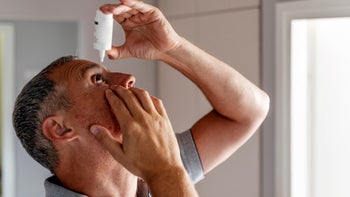
Which Over-the-Counter Medications Treat Itchy Eyes?
Key takeaways:
Itchy eyes are generally caused by seasonal allergies. You may also experience other related symptoms, such as dry, watery, and red eyes.
Many over-the-counter (OTC) medications are available to treat itchy eyes. They tend to focus on keeping your eyes moist and relieving symptoms of itchiness and redness.
Artificial tears, oral antihistamines, and decongestant eye drops are a few options to relieve itchiness. Antihistamine / mast cell stabilizer eye drops are also go-to OTC options for itchy eyes.
Table of contents

Few things are more irritating than itchy eye symptoms. Dry, watery, and red eyes can be uncomfortable and disruptive to your daily life.
At most pharmacies you visit, you’ll notice that many over-the-counter (OTC) medications are available to relieve itchy eye symptoms. But with several products available, how do you choose the best allergy medicine for itchy eyes?
Here, we’ll cover OTC treatment options for itchy eye symptoms. We’ll also review signs and symptoms that should prompt you to talk to a healthcare professional about treatments beyond what you can get OTC.
Search and compare options
What usually causes itchy eyes?
Allergies are the most common cause of itchy eyes. Allergies are your body’s reaction to allergens (substances that trigger allergies), such as pollen, pet dander, and mold.
When allergens make contact with the surface of your eye, mast cells (cells from your immune system) release histamine. Mast cells are responsible for triggering allergy symptoms, and histamine is a natural chemical that your body makes during an allergic reaction.
Histamine release can cause inflammation. When this happens, symptoms often include itchy, swollen, or red eyes. Sensitivity to light and burning eyes are also possible.
What are the best over-the-counter (OTC) medications for itchy eyes?
When possible, it’s important to avoid or limit contact with the allergen that’s causing trouble. And as tempting as it may be, you should also avoid rubbing your eyes. Rubbing could release more histamine, causing them to feel more irritated. It also raises the odds of experiencing an eye infection.
Medications can come in handy too. If you’re dealing with a brief, mild case of itchy eyes, you may find the following OTC products helpful.
1. Artificial tears
If you have dry eye, you may experience itchy eyes too. Artificial tears can help relieve both of these symptoms by keeping your eyes moist. Refresh Classic (polyvinyl alcohol / povidone), Clear Eyes Natural Tears (polyvinyl alcohol / povidone), and Visine Dry Eye Relief (polyethylene glycol) are three common artificial tear products.
Natural at-home treatments: Medications aren’t the only options for itchy eye relief. Discover other remedies to consider.
Medication safety: Some allergy medications are safer for treating itchy eye symptoms in older adults. Learn about safe allergy medications for seniors here.
Allergy medications and blood pressure: Certain allergy medications can raise your blood pressure. Here are the safest treatment options if you have hypertension.
Artificial tears come as eye drops, ointments, and gels. Keep in mind that ointments and gels are thicker than eye drops, so they may cause blurry vision after applying them. For this reason, it’s a good idea to apply ointments and gels at bedtime.
Many generic and name-brand artificial tears are available. It’s important to follow the provided instructions for how to best use the specific product you choose. Check out the “Drug Facts” label, which is printed on all OTC products, for more information.
Good to know: Certain artificial tear products have been recalled because of safety concerns. One reason is bacterial contamination. Before using any artificial tear eye drops, check with your pharmacist to make sure yours is safe to use.
2. Oral antihistamines
If you’d rather take a pill, you could try an OTC oral antihistamine. Antihistamines are a group of medications that manage various allergic conditions. They block histamine in order to relieve itchy eyes.
However, not all antihistamines are the same. Antihistamines are divided into two groups.
Read more like this
Explore these related articles, suggested for readers like you.
Older (first-generation) antihistamines, such as diphenhydramine (Benadryl), are one option. But they have side effects, such as dry eye, that may actually worsen itchy eye symptoms. They can also make you drowsy.
Newer antihistamines — called second- and third-generation antihistamines — typically don’t cause dry eye. They also don’t make you as sleepy as first-generation antihistamines. Common examples include:
Cetirizine (Zyrtec)
Loratadine (Claritin)
Fexofenadine (Allegra)
Levocetirizine (Xyzal)
3. Antihistamine / mast cell stabilizer eye drops
Antihistamines are also available as eye drops. But like their oral counterparts, there’s more than meets the eye.
Olopatadine (Pataday), ketotifen (Alaway, Systane Zaditor), alcaftadine (Lastacaft) and other similar products are all considered antihistamines and mast cell stabilizers. Mast cell stabilizers work by stopping additional histamine release in the eye. These eye drops relieve itchiness while also treating and preventing eye allergies.
How often you use your specific antihistamine / mast cell stabilizer eye drop depends on which one you choose. Notably, for some people, these eye drops can cause dry or itchy eyes as a side effect, so determining what works for you is important. Your pharmacist can help you choose the best allergy eye drop for your symptoms and provide information about how to use them safely and effectively.
4. Decongestant eye drops
Decongestant eye drops are another option. They address itchy eye symptoms by reducing redness and dryness.
One common decongestant is Clear Eyes Redness Relief (naphazoline / glycerin). Naphazoline is a decongestant that works by making the blood vessels in your eyes more narrow, which relieves redness. Glycerin acts as a lubricant to treat dry, burning eyes.
In addition to Clear Eyes Redness Relief, other combination products are also available that contain a decongestant and antihistamine. Products such as Naphcon-A (naphazoline / pheniramine), Opcon-A (naphazoline / pheniramine), and Visine Allergy Eye Relief Multi-Action (naphazoline / pheniramine) are a few examples.
There are some downsides to decongestant eye drops. They may raise your blood pressure and the pressure in your eye. If you have high blood pressure or glaucoma (high eye pressure), reach out to your healthcare professional. They can let you know if decongestant eye drops are safe for you to use.
Keep in mind: It’s not recommended to use a decongestant eye drop for more than 3 days at a time. Your body may stop responding to these medications, and your eye allergy symptoms can come back after you stop using them. This is also known as “rebound redness.”
Are there any prescription medications that treat itchy eyes?
Yes. In addition to OTC medications, many prescription medications can treat itchy eyes. If your OTC medication doesn’t work, you should talk to your healthcare professional. It’s possible that a prescription eye drop could be a better option for you.
Here’s a list of commonly used prescription eye drops.
| Medication type | Medication name |
|---|---|
| Antihistamines | Cetirizine (Zerviate) |
| Mast cell stabilizers | Cromolyn sodium |
| Lodoxamide (Alomide) | |
| Antihistamine/mast cell stabilizers | Azelastine |
| Bepotastine (Bepreve) | |
| Epinastine | |
| Nonsteroidal anti-inflammatory drugs/td> | Ketorolac (Acular, Acuvail) |
| Corticosteroids | Loteprednol (Lotemax) |
| Prednisolone (Pred Forte) |
Are there any effective natural or home remedies for itchy eyes?
Yes. There are many itchy eye home remedies that can effectively reduce allergen exposure. They can also help prevent allergies from happening in the first place.
Indoor allergens
When you’re at home, these allergen-reduction tips can help keep your symptoms in check:
Frequently vacuum with a HEPA filter to reduce the amount of dust in your home.
Try keeping pets out of your bedroom or on furniture.
Replace carpeting with dander-free flooring (like hardwoods, tile, or linoleum).
Use “mite-proof” bedding covers and wash weekly.
To limit your exposure to mold, keep the humidity in your home between 35% and 50%.
Outdoor allergens
In many cases, it’s impossible to avoid outdoor allergens. But there are still a few steps you can take to control your symptoms:
Stay indoors as much as possible when pollen counts are at their peak — usually during the morning hours or when the day is windy and warm.
Keep your windows closed.
Use window screen filters to help filter out allergens.
Change your clothes and shower after outdoor activities, such as hiking or sports.
These aren’t the only options. Your prescriber or pharmacist may recommend alternative allergy remedies that could be worth trying.
When should you see a healthcare professional for itchy eyes?
Itchy eye symptoms don’t usually need medical attention. And many people with mild allergies can manage their symptoms on their own by simply avoiding allergens or using an OTC medication.
This isn’t always the case, though. You should consider seeing a healthcare professional for testing and treatment as soon as possible if you have any of the following symptoms:
Severe itching
Vision changes, including the appearance of floaters
Sudden sensitivity to light
Eye pain
Any noticeable symptoms if you wear contact lenses
How long can you use over-the-counter eye drops before seeing a healthcare professional?
You can use most OTC eye drops for a few days before seeing a healthcare professional. But the exact number of days depends on the product you’re using. For instance, you shouldn’t use a decongestant eye drop for more than 3 days at a time. But some medications can be used for 14 days (2 weeks) or more. It all depends on the product.
If you wonder how long you should use an OTC medication, be sure to check with your local pharmacist or other healthcare professional. Be sure to ask your local pharmacist if you have questions about an OTC product if you aren’t clear how long to use a product for.
If your itchy eye symptoms don’t improve after a recommended amount of time — or if they get worse at any point — this is another reason to contact your healthcare professional. They’ll need to check that your symptoms are, in fact, due to allergies and not other causes. They can also recommend a more effective treatment option, if needed.
The bottom line
If you’re looking for relief from itchy eye symptoms caused by allergies, you have several over-the-counter (OTC) medicines to choose from. Artificial tears, oral antihistamines, and decongestant eye drops are a few examples. Antihistamine / mast cell stabilizer eye drops are another option. Consider talking with your local pharmacist to determine which of the OTC options may be right for your symptoms. OTC medications are usually sufficient, but prescription medications are also available if you can't find adequate relief.
If your itchy eyes don't improve after a few days, or you're experiencing symptoms like vision changes, fever, or eye pain, contact your healthcare professional. These symptoms could be a sign of something more serious.
Why trust our experts?



References
Alcon Laboratories, Inc. (2024). Naphcon A- naphazoline hydrochloride and pheniramine maleate solution/ drops [package insert]. DailyMed.
American Academy of Allergy, Asthma, & Immunology. (n.d.). Eye (ocular) allergy.
American College of Allergy, Asthma, & Immunology. (n.d.). Eye allergy.
American College of Allergy, Asthma, & Immunology. (2017). Seasonal allergies.
American Academy of Allergy, Asthma, & Immunology. (2020). Eye drops.
A-S Medication Solutions. (2024). Refresh Classic- polyvinyl alcohol, povidone solution/ drops [package insert]. DailyMed.
Bausch & Lomb Incorporated. (2023). Opcon-A- naphazoline hydrochloride and pheniramine maleate solution/ drops [package insert]. DailyMed.
Farzam, K., et al. (2023). Antihistamines. StatPearls.
Johnson & Johnson Consumer Inc. (2023). Visine Dry Eye Relief Eye Drops- polyethylene glycol 400 solution/ drops [package insert]. DailyMed.
Johnson & Johnson Consumer Inc. (2024). Visine Allergy Eye Relief Multi-Action- naphazoline hydrochloride and pheniramine maleate solution/ drops [package insert]. DailyMed.
Prestige Brands Holdings, Inc. (2024). Clear Eyes Natural Tears- polyvinyl alcohol and povidone liquid [package insert]. DailyMed.
Vordenberg, S. E. (2024). Nonprescription medications for eye allergies. JAMA Network.





























